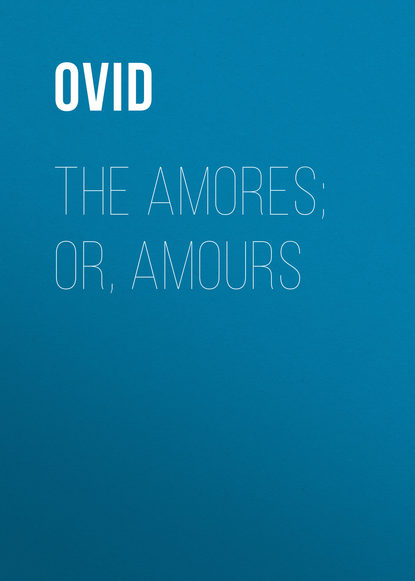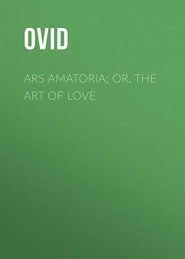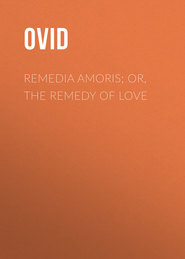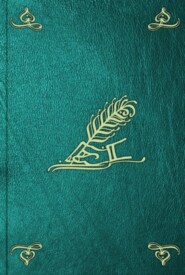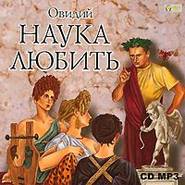По всем вопросам обращайтесь на: info@litportal.ru
(©) 2003-2024.
✖
The Amores; or, Amours
Настройки чтения
Размер шрифта
Высота строк
Поля
230 (return (#x2_x_2_i61))
[ Ennius.—Ver. 19. Quintus Ennius was a Latin poet, a Calabrian by birth. He flourished about 408 years before Christ. The few fragments of his works that remain, show the ruggedness and uncouth nature of his style. He wrote the Annals of Italy in heroic verse.]
231 (return (#x2_x_2_i61))
[ Accius.—Ver. 19. See the Second Book of the Tristia, 1. 359, and the Note to the passage.]
232 (return (#x2_x_2_i62))
[ Of Varro.—Ver. 21. He refers to Publius Terentius Varro Attacinus, who wrote on the Argonautic expedition. See the Tristia, Book ii. 1. 439, and the Pontic Epistles, Book iv. Ep. xvi. 1. 21.]
233 (return (#x2_x_2_i62))
[ Lucretius.—Ver. 23. Titus Lucretius Carus is referred to, whose noble poem on the Epicurean philosophy is still in existence (translated in Bohn's Classical Library). See the Tristia, Book ii. 1. 261 and 426, and the Notes to those passages.]
234 (return (#x2_x_2_i62))
[ Tityrus.—Ver. 25. Under this name he alludes to Virgil, who introduces himself under the name of Tityrus, in his first Eclogue, See the Pontic Epistles, *Boek iv. Ep. xvi. 1. 33.]
235 (return (#x2_x_2_i62))
[ So long as thou, Rome.—Ver. 26. His prophecy has been surpassed by the event. Rome is no longer the 'caput urbis,' but the works of Virgil are still read by all civilized nations.]
236 (return (#x2_x_2_i62))
[ Polished Tibullus.—Ver. 28. Albius Tibullus was a Roman poet of Equestrian rank, famous for the beauty of his compositions. He was born in the same year as Ovid, but died at an early age. Ovid mentions him in the Tristia, Book ii. 1. 447 and 463, Book iv. Ep. x. 1. 52, and Book v. Ep. i. 1. 18. In the Third Book of the Amores, El. 9, will be found his Lament on the death of Tibullus.]
237 (return (#x2_x_2_i62))
[ Gallus —Ver. 29. Cornelius Gallus was a Roman poet of considerable merit. See the Tristia, Book ii 1. 445, and the Note to the passage, and the Amores, Book iii. El. 1.]
238 (return (#x2_x_2_i62))
[ By the East.—Ver. 29. Gallus was the Roman governor of Egypt, which was an Eastern province of Rome.]
239 (return (#x2_x_2_i62))
[ The golden Tagus.—Ver. 34. Pliny and other authors make mention of the golden sands of the Tagus, which flowed through the province of Lusitania, now Portugal.]
240 (return (#x2_x_2_i63))
[ The closing fire.—Ver. 41. Pliny says that the ancient Romans buried the dead; but in consequence of the bones being disturbed by continual warfare, they adopted the system of burning them.]
FOOTNOTES BOOK TWO:
301 (return (#x3_x_3_i4))
[ The watery Peligni.—Ver. 1. In the Fourth Book of the Fasti, 1. 81, and the Fourth Book of the Tristia, 1. x. El. 3, he mentions Sulmo, a town of the Peligni, as the place of his birth. It was noted for its many streams or rivulets.]
302 (return (#x3_x_3_i5))
[ And Gyges.—Ver. 12. This giant was more generally called Gyas. He and his hundred-handed brothers, Briareus and Cæus, were the sons of Coelus and Terra.]
303 (return (#x3_x_3_i6))
[ Verses bring down.—Ver. 23. He alludes to the power of magic spells, and attributes their efficacy to their being couched in poetic measures; from which circumstance they received the name of 'carmina.']
304 (return (#x3_x_3_i6))
[ And by verses.—Ver. 28. He means to say that in the same manner as magic spells have brought down the moon, arrested the sun, and turned back rivers towards their source, so have his Elegiac strains been as wonderfully successful in softening the obduracy of his mistress.]
305 (return (#x3_x_3_i10))
[ Bagous.—Ver. 1. The name Bagoas, or, as it is here Latinized. Bagous, is said to have signified, in the Persian language, 'an eunuch.' It was probably of Chaldæan origin, having that meaning. As among the Eastern nations of the present day, the more jealous of the Romans confided the care of their wives or mistresses to eunuch slaves, who were purchased at a very large price.]
306 (return (#x3_x_3_i10))
[ Daughters of Danaus.—Ver. 4. The portico under the temple of Apollo, on the Palatine Hill, was adorned with the statues of Danaus, the son of Belus, and his forty-nine guilty daughters. It was built by Augustus, on a spot adjoining to his palace. Ovid mentions these statues in the Third Elegy of the Third Book of the Tristia, 1. 10.]
307 (return (#x3_x_3_i11))
[ Let him go.—Ver. 20. 'Eat' seems here to mean 'let him go away' from the house; but Nisard's translation renders it 'qu'il entre,' 'let him come in.']
308 (return (#x3_x_3_i11))
[ At the sacrifice.—Ver. 23. It is hard to say what 'si faciet tarde' means: it perhaps applies to the rites of Isis, mentioned in the 25th line.]
309 (return (#x3_x_3_i11))
[ Linen-clad Isis.—Ver. 25. Seethe 74th line of the Eighth Elegy of the preceding Book, and the Note to the passage; and the Pontic Epistles, Book i. line 51, and the Note. The temple of Isis, at Rome, was in the Campus Martius, or Field of Mars, near the sheep market. It was noted for the intrigues and assignations of which it was the scene.]
310 (return (#x3_x_3_i12))
[ He turns the house.—Ver. 29. As the Delphin Editor says, 'Il peut renverser la maison,' 'he can turn the house upside down.']
311 (return (#x3_x_3_i12))
[ The masters approve..—Ver. 30. He means to say that the eunuch and his mistress will be able to do just as they please.]
312 (return (#x3_x_3_i12))
[ An executioner.—Ver. 36. To blind the husband, by pretending harshness on the part of Bagous.]
313 (return (#x3_x_3_i12))
[ Of the truth.—Ver. 38 This line is corrupt, and there are about ten various readings. The meaning, however, is clear; he is, by making false charges, to lead the husband away from a suspicion of the truth; and to put him, as we say, in common parlance, on the wrong scent.]
314 (return (#x3_x_3_i12))
[ Ennius.—Ver. 19. Quintus Ennius was a Latin poet, a Calabrian by birth. He flourished about 408 years before Christ. The few fragments of his works that remain, show the ruggedness and uncouth nature of his style. He wrote the Annals of Italy in heroic verse.]
231 (return (#x2_x_2_i61))
[ Accius.—Ver. 19. See the Second Book of the Tristia, 1. 359, and the Note to the passage.]
232 (return (#x2_x_2_i62))
[ Of Varro.—Ver. 21. He refers to Publius Terentius Varro Attacinus, who wrote on the Argonautic expedition. See the Tristia, Book ii. 1. 439, and the Pontic Epistles, Book iv. Ep. xvi. 1. 21.]
233 (return (#x2_x_2_i62))
[ Lucretius.—Ver. 23. Titus Lucretius Carus is referred to, whose noble poem on the Epicurean philosophy is still in existence (translated in Bohn's Classical Library). See the Tristia, Book ii. 1. 261 and 426, and the Notes to those passages.]
234 (return (#x2_x_2_i62))
[ Tityrus.—Ver. 25. Under this name he alludes to Virgil, who introduces himself under the name of Tityrus, in his first Eclogue, See the Pontic Epistles, *Boek iv. Ep. xvi. 1. 33.]
235 (return (#x2_x_2_i62))
[ So long as thou, Rome.—Ver. 26. His prophecy has been surpassed by the event. Rome is no longer the 'caput urbis,' but the works of Virgil are still read by all civilized nations.]
236 (return (#x2_x_2_i62))
[ Polished Tibullus.—Ver. 28. Albius Tibullus was a Roman poet of Equestrian rank, famous for the beauty of his compositions. He was born in the same year as Ovid, but died at an early age. Ovid mentions him in the Tristia, Book ii. 1. 447 and 463, Book iv. Ep. x. 1. 52, and Book v. Ep. i. 1. 18. In the Third Book of the Amores, El. 9, will be found his Lament on the death of Tibullus.]
237 (return (#x2_x_2_i62))
[ Gallus —Ver. 29. Cornelius Gallus was a Roman poet of considerable merit. See the Tristia, Book ii 1. 445, and the Note to the passage, and the Amores, Book iii. El. 1.]
238 (return (#x2_x_2_i62))
[ By the East.—Ver. 29. Gallus was the Roman governor of Egypt, which was an Eastern province of Rome.]
239 (return (#x2_x_2_i62))
[ The golden Tagus.—Ver. 34. Pliny and other authors make mention of the golden sands of the Tagus, which flowed through the province of Lusitania, now Portugal.]
240 (return (#x2_x_2_i63))
[ The closing fire.—Ver. 41. Pliny says that the ancient Romans buried the dead; but in consequence of the bones being disturbed by continual warfare, they adopted the system of burning them.]
FOOTNOTES BOOK TWO:
301 (return (#x3_x_3_i4))
[ The watery Peligni.—Ver. 1. In the Fourth Book of the Fasti, 1. 81, and the Fourth Book of the Tristia, 1. x. El. 3, he mentions Sulmo, a town of the Peligni, as the place of his birth. It was noted for its many streams or rivulets.]
302 (return (#x3_x_3_i5))
[ And Gyges.—Ver. 12. This giant was more generally called Gyas. He and his hundred-handed brothers, Briareus and Cæus, were the sons of Coelus and Terra.]
303 (return (#x3_x_3_i6))
[ Verses bring down.—Ver. 23. He alludes to the power of magic spells, and attributes their efficacy to their being couched in poetic measures; from which circumstance they received the name of 'carmina.']
304 (return (#x3_x_3_i6))
[ And by verses.—Ver. 28. He means to say that in the same manner as magic spells have brought down the moon, arrested the sun, and turned back rivers towards their source, so have his Elegiac strains been as wonderfully successful in softening the obduracy of his mistress.]
305 (return (#x3_x_3_i10))
[ Bagous.—Ver. 1. The name Bagoas, or, as it is here Latinized. Bagous, is said to have signified, in the Persian language, 'an eunuch.' It was probably of Chaldæan origin, having that meaning. As among the Eastern nations of the present day, the more jealous of the Romans confided the care of their wives or mistresses to eunuch slaves, who were purchased at a very large price.]
306 (return (#x3_x_3_i10))
[ Daughters of Danaus.—Ver. 4. The portico under the temple of Apollo, on the Palatine Hill, was adorned with the statues of Danaus, the son of Belus, and his forty-nine guilty daughters. It was built by Augustus, on a spot adjoining to his palace. Ovid mentions these statues in the Third Elegy of the Third Book of the Tristia, 1. 10.]
307 (return (#x3_x_3_i11))
[ Let him go.—Ver. 20. 'Eat' seems here to mean 'let him go away' from the house; but Nisard's translation renders it 'qu'il entre,' 'let him come in.']
308 (return (#x3_x_3_i11))
[ At the sacrifice.—Ver. 23. It is hard to say what 'si faciet tarde' means: it perhaps applies to the rites of Isis, mentioned in the 25th line.]
309 (return (#x3_x_3_i11))
[ Linen-clad Isis.—Ver. 25. Seethe 74th line of the Eighth Elegy of the preceding Book, and the Note to the passage; and the Pontic Epistles, Book i. line 51, and the Note. The temple of Isis, at Rome, was in the Campus Martius, or Field of Mars, near the sheep market. It was noted for the intrigues and assignations of which it was the scene.]
310 (return (#x3_x_3_i12))
[ He turns the house.—Ver. 29. As the Delphin Editor says, 'Il peut renverser la maison,' 'he can turn the house upside down.']
311 (return (#x3_x_3_i12))
[ The masters approve..—Ver. 30. He means to say that the eunuch and his mistress will be able to do just as they please.]
312 (return (#x3_x_3_i12))
[ An executioner.—Ver. 36. To blind the husband, by pretending harshness on the part of Bagous.]
313 (return (#x3_x_3_i12))
[ Of the truth.—Ver. 38 This line is corrupt, and there are about ten various readings. The meaning, however, is clear; he is, by making false charges, to lead the husband away from a suspicion of the truth; and to put him, as we say, in common parlance, on the wrong scent.]
314 (return (#x3_x_3_i12))





